Is your shower losing water pressure? Do you see a soap scum build-up and white deposits on the fixtures? You might have a hard water problem. Hard water consists of minerals like calcium and magnesium found in tap water, which can cause problems with plumbing, appliances, laundry, dishes – and even your skin!
Fortunately, there are simple solutions to help fix this issue. Whether you own or rent a home, here are some tips and tricks to help fix your hard water problem in the shower.
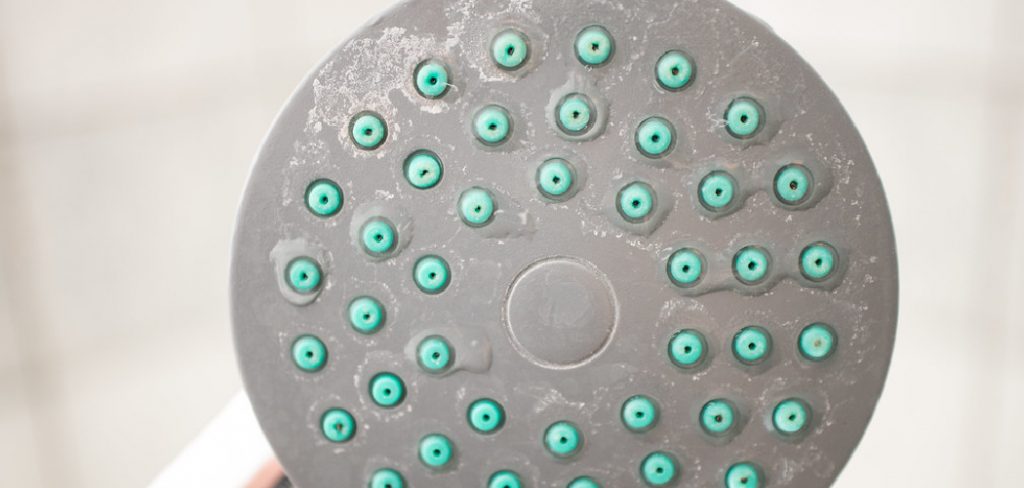
In this blog post, we’ll explore everything you need to know about how to fix hard water in shower – from identifying the signs of hard water to easy fixes that won’t break the bank. So if you’re struggling with low pressure or limescale buildup in your shower, it’s time for some DIY detective work – let’s get started!
What are the Causes of Hard Water in the Shower?
The main culprit is your local water supply. You see, as water runs through the soil and over rocks, it picks up certain minerals like calcium and magnesium, which can lead to hard water.
Other potential causes of hard water in the shower include a build-up of soap scum or limescale from previous use. Your plumbing system on its own could also be responsible for a decrease in pressure – if your pipes are corroded or clogged with sediment, you’ll likely experience low water pressure.
What Will You Need?
To get started, you’ll want to gather the supplies listed below:
- Water softener or filter
- Cleaning supplies like vinegar, baking soda, and lemon juice
- A scrub brush or scouring pad
- An old toothbrush (optional)
Once you have all your supplies, you’re ready to begin.
10 Easy Steps on How to Fix Hard Water in Shower
1. Install a Water Softener:
A water softening system can help reduce tap water’s calcium and magnesium levels. It works by exchanging sodium ions for hard minerals, resulting in softer water.
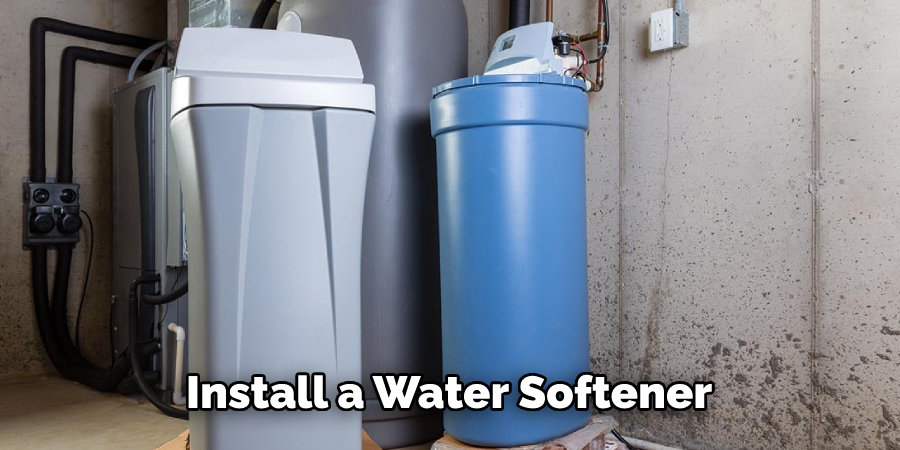
2. Use Vinegar:
Vinegar is a natural cleaner that can help remove soap scum and limescale buildup on your shower fixtures and walls. To use, simply mix one part vinegar with two parts warm water in a spray bottle and apply the mixture to the affected areas. Allow it to sit for 10-15 minutes before scrubbing with a brush or sponge.
3. Clean Regularly:
To prevent hard water from building up, make sure you clean your shower regularly – at least once every week or two (depending on usage). Gently scrub away any soap scum or mineral deposits using mild detergent and hot water. For tougher jobs, try using baking soda to create a paste.
4. Install a Shower Filter:
If you’re looking for a more permanent solution, consider installing a shower filter to help reduce the amount of minerals in your water. These filters use activated carbon or ceramic beads to trap impurities before they enter the showerhead.
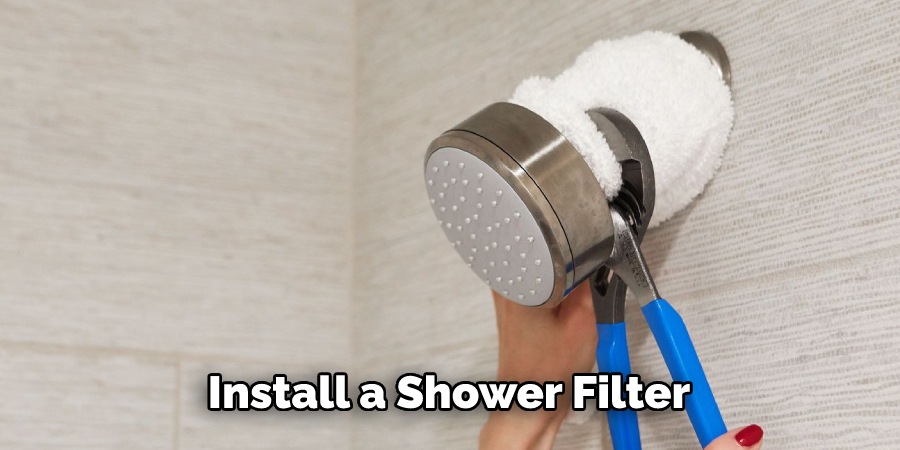
5. Use Lemon Juice or Baking Soda Paste:
Lemon juice and baking soda are great natural cleaners that can be used to remove soap scum and hard water deposits from your shower fixtures. Mix equal parts baking soda with lemon juice (or vinegar) to make a paste until it forms a thick consistency. Apply the paste to areas with buildup and allow it to sit for 10-15 minutes before scrubbing away any residue.
6. Use a Descaler:
If you’re struggling to remove hard water deposits from your shower fixtures, try using a descaler like CLR or Lime Away. These products are specially formulated to dissolve limescale buildup, and they can be used on metal, ceramic and plastic surfaces.
7. Check Your Plumbing System:
In some cases, hard water can cause your plumbing system to become clogged with sediment or debris. To avoid any potential problems, make sure you regularly check for signs of corrosion or blockages in the pipes. You may also want to consider getting a professional inspection if necessary – especially if you’re experiencing low pressure or poor water flow in certain areas of the house.
8. Change Your Showerhead:
If you’ve been dealing with hard water for a while, it’s possible that your showerhead is already starting to corrode or break down. To avoid further damage, try swapping out your old showerhead for a newer one with an anti-scale filter. That way, the filtered water will be softer and free of any harmful minerals.
9. Use a Water Softener Shampoo:
To help make sure that your hair and skin stay soft and healthy, consider using a shampoo specifically designed for hard water. These shampoos are formulated with special ingredients that can help combat the negative effects of calcium and magnesium in the water supply.
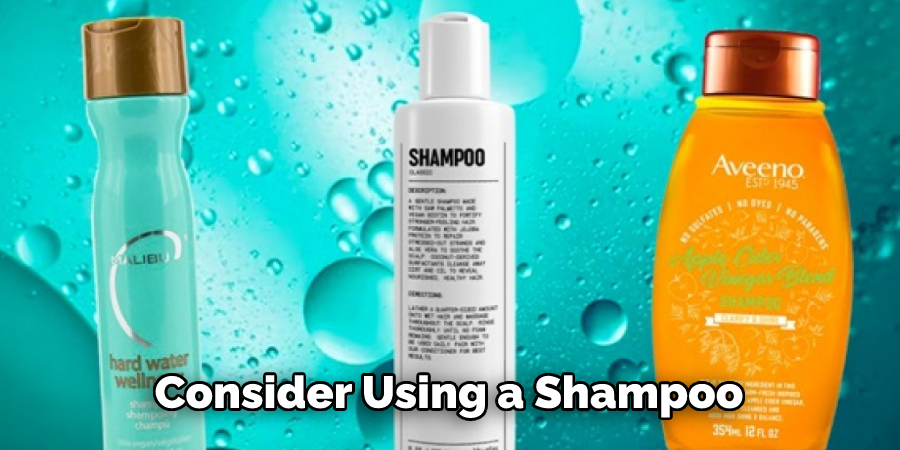
10. Clean Your Showerhead:
Finally, make sure you clean the showerhead on a regular basis to prevent any buildup of hard water minerals. You can do this by removing the showerhead and soaking it in a solution of vinegar or lemon juice for 10-15 minutes. Afterward, scrub away any residue with an old toothbrush or scouring pad before reattaching the head and turning on the water.
Following these steps should help you get rid of any annoying hard water stains and keep your shower cleaner for longer! Hopefully, now you know how to fix hard water in the shower.
5 Additional Tips and Tricks
1. Use a Soft Bristle Brush: To avoid scratching the surface of your fixtures, use a soft bristled brush when cleaning.
2. Try Boiling Water: In some cases, boiling water can help reduce the amount of minerals present in hard water.
3. Replace Old Pipes and Fixtures: Consider replacing any old pipes or fixtures that may be corroded due to years of exposure to hard water.
4. Test Your Water Regularly: Test your water regularly to ensure that it’s safe for use.
5. Keep an Eye Out for Leaks: Make sure to inspect your plumbing system for any signs of leaks. This will prevent costly water damage and help keep your home safe.
Following these tips should help you effectively manage hard water in your shower and keep it looking and feeling great for years to come!
5 Things You Should Avoid
1. Avoid Using Abrasive Products: Using abrasive products like steel wool or scouring pads can damage your fixtures and leave behind scratches.
2. Don’t Use Too Much Cleaner: Excess cleaner can cause the surfaces in your bathroom to become slippery, which can be dangerous.
3. Don’t Ignore Warning Signs: If you start noticing any warning signs such as a decrease in water pressure, get it checked out immediately.
4. Don’t Overlook Regular Maintenance: Make sure to keep up with regular maintenance and check for signs of corrosion or blockages in your plumbing system.
5. Avoid Acidic Cleaners: Acidic cleaners can corrode metal pipes and fixtures, so avoid using them whenever possible.
By following these tips and avoiding these common mistakes, you can keep your shower free of hard water buildup and ensure that it looks great for years!
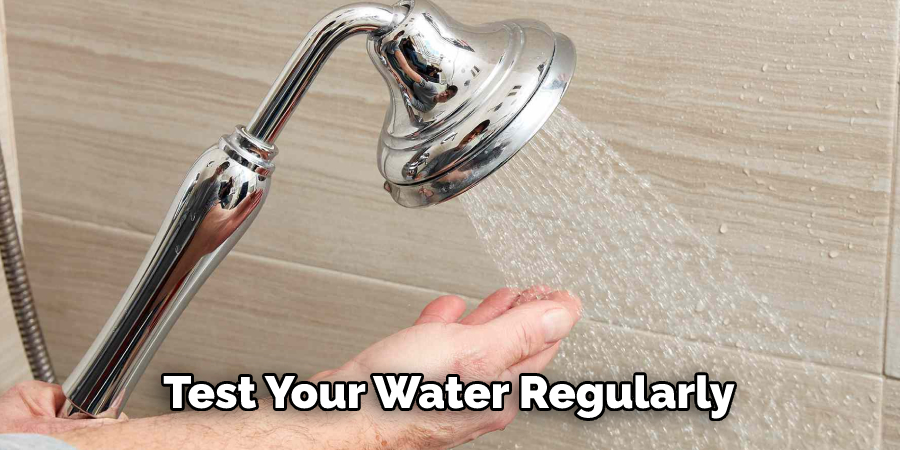
How to Tell If You Have Hard Water in Shower?
There are a few telltale signs that indicate you might have a hard water problem:
• Low Water Pressure: Hard water can leave a build-up of minerals on the inside of your pipes, resulting in low water pressure.
• Water Spots: If you’re noticing stains or spots on your shower walls and fixtures, that could be a sign of hard water.
• Clogged Drains: Minerals like calcium and magnesium can accumulate in drains, causing them to clog up over time.
• Unpleasant Odor: Some people report an unpleasant smell coming from their showers when they have hard water.
If you notice any of these signs, it’s a good idea to get your water tested for hardness levels so you can take the proper steps to address the issue. With the right approach and knowledge, it’s easy to combat hard water and keep your shower running smoothly. Now that you know how to fix it, it’s time to implement these tips!
Conclusion
When it comes to hard water in a shower, oftentimes, the best solution is to make small tweaks that can add up over time. While you can try some more intensive solutions, such as installing a water softener or specialized filter, these might not be necessary if you find that just taking steps like cleaning out your shower head and using a vinegar rinse are making a noticeable difference.
Of course, while you can try out these solutions yourself, it’s always best to consult with an expert if things don’t improve. Overall, tackling hard water in your shower doesn’t have to be a difficult endeavor—just commit to taking small steps and understanding your home’s unique needs!
Hopefully, the article on how to fix hard water in shower has been a helpful guide in understanding how to address the issue and make your shower feel like new again. With the right approach, you can easily reduce buildup and keep your bathroom looking beautiful for years to come. Good luck!
